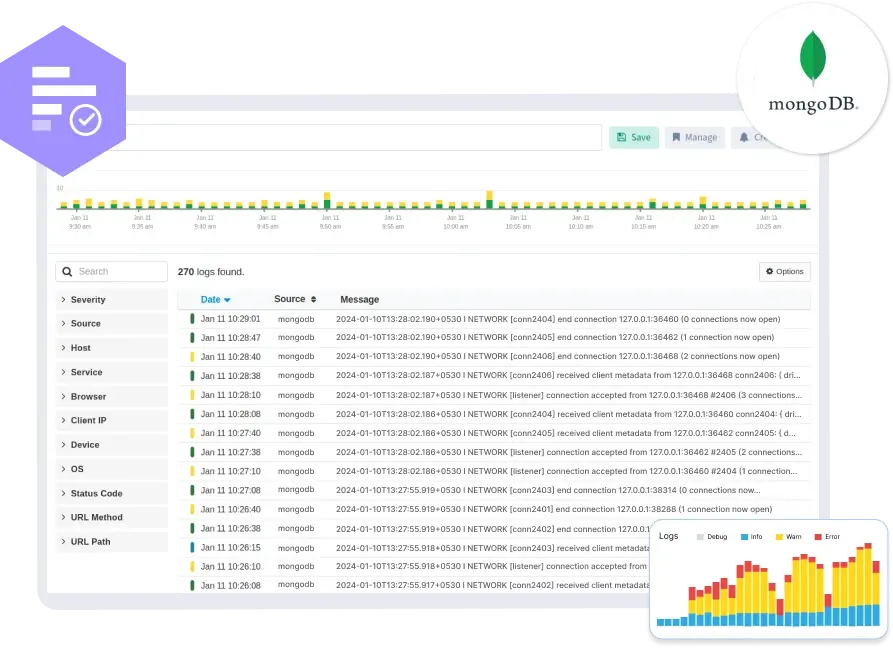MongoDB Monitoring
Monitor MongoDB like never before! Gain real-time insights, trace distributed operations, and ensure peak performance with comprehensive MongoDB monitoring.
Sign Up for Free
Monitor MongoDB like never before! Gain real-time insights, trace distributed operations, and ensure peak performance with comprehensive MongoDB monitoring.
Sign Up for Free
Monitor these key metrics to ensure your MongoDB database performs efficiently and reliably, allowing you to detect potential issues before they impact query performance and data integrity.
Measures the number of operations (reads, writes, updates, and deletes) processed per second. Sudden drops or spikes may indicate workload imbalances or performance bottlenecks within your MongoDB cluster.
Tracks the time taken to execute database queries, focusing on slow queries. High execution times often point to inefficient query structures or missing indexes that impact application performance.
Monitors the delay between the primary and secondary nodes in a MongoDB replica set. Significant lag can compromise data consistency and affect failover mechanisms in distributed systems.
Measures the amount of memory actively used by MongoDB processes. High memory consumption may lead to increased disk I/O and degraded performance if not optimized properly.
Tracks the number of active client connections to the MongoDB instance. Exceeding connection limits can cause service interruptions and affect database accessibility during peak loads.
Monitors the size and frequency of logs generated by a container. Sudden spikes in log volume can signal errors or abnormal behavior in the application.
MongoDB monitoring matters because it helps track critical metrics like query execution time, replication lag, and memory usage, ensuring optimal database performance and reliability. By monitoring MongoDB in real-time, you can identify bottlenecks, optimize resource utilization, and maintain data consistency across clusters and replica sets.
MongoDB monitoring ensures seamless query execution by providing real-time insights into query performance. By tracking slow queries and optimizing indexing, it helps reduce response times and enhances user experience. Proactively identify and resolve performance bottlenecks before they impact your application.

With MongoDB’s distributed architecture, monitoring becomes essential to maintain data consistency and minimize replication lag. MongoDB monitoring enables visibility into replica sets and shard performance, ensuring synchronized data flow across nodes and keeping your system reliable and consistent.

MongoDB monitoring in Atatus includes advanced tools like Service Map and Distributed Tracing. These features help you trace requests across services and databases, providing a clear view of dependencies and interactions. Easily pinpoint issues in complex architectures and ensure seamless operation.

MongoDB monitoring tracks critical metrics like memory usage and cache performance, helping you optimize resource allocation. By identifying memory-intensive operations, you can fine-tune your database to prevent slowdowns and reduce hardware costs while maintaining peak efficiency.

Atatus MongoDB Monitoring tracks query execution times and highlights slow-running queries. By analyzing these metrics, you can optimize queries, create appropriate indexes, and improve performance.
Atatus tracks the delay between primary and secondary nodes in a replica set. Real-time alerts notify you if the lag exceeds acceptable thresholds, helping maintain data consistency across replicas.
Yes, Atatus provides insights into index usage frequency and effectiveness. It helps identify unused or missing indexes, optimizing query execution and reducing resource consumption.
Yes, Atatus monitors CPU, memory, and disk usage to identify resource constraints. Proactive alerts ensure you can allocate additional resources before performance issues occur.
Atatus tracks container uptime, replica health, and node availability, ensuring MongoDB instances remain operational and quickly detecting issues that could lead to downtime.
Avail Atatus features for 14 days free-trial. No credit card required. Instant set-up.